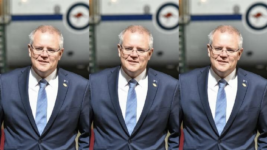Morrison’s Multi-Ministry Power Grab Had Nothing to Do with the Pandemic

“In other words, Mr Morrison had been appointed to administer six of the fourteen departments of state,” former High Court Justice Virginia Bell remarks towards the beginning of her report into the Morrison multi-ministries scandal that came to light earlier this year.
Bell sets out that over the period March 2020 through to May 2021, former PM Scott Morrison was appointed to administer five other ministries besides his own, the Department of Prime Minister and Cabinet (PMC), and he even contemplated taking on a seventh role.
The former judge found that whilst Morrison attempted to explain away his power grab under the excuse that the extremes of the pandemic period called for these unprecedented measures, this doesn’t hold up, and in the case of the majority of extra ministries, it doesn’t even apply.
In response to the release of the report on the “shadow government” that he commissioned, PM Anthony Albanese stressed that not only were Morrison’s action “extraordinary”, but so too, is the fact that “members of the former government… enabled this culture of secrecy”.
And while Labor has indicated it will likely legislate recommendations made by Bell to avoid any such attempt to undermine Australian democracy again, Morrison has continued to justify his actions, as he underscored that he didn’t break any laws as he was further eroding public trust in government.
No acceptable justification
Bell outlines that Morrison had the governor general appoint him dual administrator of Health on the 14th and Finance on 30 March 2020, with these measures being taken due to the heightened importance placed on these ministries by the pandemic and the risk a minister could fall ill.
“The appointments, however, were unnecessary,” the inquiry found, as, if either the health or finance minister had been struck down, “Morrison could have been authorised to act as minister for health or minister for finance in a matter of minutes”.
The further appointments were different though, as they had “little if any connection to the pandemic”, rather “Morrison was appointed to administer these departments to give himself the capacity to exercise particular statutory powers”.
This involved his taking on dual administration of the Department of Industry, Science, Energy and Resources (DISER) on 15 April 2021 and Treasury and Home Affairs on 6 May that year.
Indeed, the report found that the then prime minister also had a brief prepared by his office about his taking on the dual administration of the Department of Agriculture, Water and the Environment as well, but he then decided against doing so.
In gaining these extra statutory powers, Morrison only exercised them once. That was in terms of refusing applications for Petroleum Export Permit 11. And it was to refuse these specific applications that Morrison sought to be appointed the dual administrator of DISER.
While in regard to taking on Home Affairs and the Treasury, Bell outlines that Morrison’s legal representative told her that it was in the national interest to do so, to ensure there would be no gap in terms of national security in exercising powers of government.
“This concern is not easy to understand,” the ex-High Court justice makes clear, especially because there were already other ministers appointed to administer those departments, besides the actual home affairs minister and the treasurer.
Ultimate control
The report notes that whilst ministers and others were aware of the March 2020 dual administerial appointments, in regard to those made in 2021, only a few staff members within the PM’s department knew about them, and all the secrecy involved was entirely due to Morrison.
Bell concludes that as no delineation of administerial powers was made, Morrison did not have himself appointed to these positions as he was actively seeking to take over the running of the ministries, but it was instead a mechanism ensuring his ultimate control.
The then PM sought to have “the capacity to exercise particular statutory power should the minister charged with responsibility for the exercise of that power propose to do so in a manner with which Mr Morrison disagreed” or failed to make a decision he wanted made.
Bell agrees with solicitor general Stephen Donaghue in his assessment of the matter, which found that the principles of responsible government were undermined, as, due to the secrecy, parliament and in turn the constituency could not hold Morrison accountable in these administrative positions.
Probable legislative changes
The report of inquiry made six recommendations that the current PM has determined will most likely be acted upon.
The first is that any such appointments or shuffling of positions made by the governor general in relation to the ministries should either be officially gazetted or registered on the federal register of legislation.
Any appointments or authorisation of acting ministers for the period of two weeks or more should be gazetted or registered, and a list of all such acting arrangements should be periodically published on the PM’s website and/or that of the specific department.
A document should be posted on the PMC website, which outlines the ministers appointed to each department, including any dual appointments or secondary ministerial roles.
And further a website should be established detailing ministerial appointments and each department should publish information about its own current appointments.
A culture of conspiracy
The report was released on Friday. Morrison then posted a statement online, in which he continued to justify his decision to take on the extra ministries, stating that his “awareness of issues regarding national security and the national interest was broader than that” of other ministers or the inquiry.
And the now Liberal MP listed a number of reasons to justify his actions, including that he didn’t break the law, that there was no process of gazetting such appointments, that he only exercised his extra powers once and that the ministers held their portfolios without any interference from him.
In his response to the findings of the inquiry, Albanese highlighted the point that the secrecy of the appointments undermined public confidence in government, and once these decisions were exposed, it’s had a further corrosive effect on public trust in government.
When questions were put to the PM about how the findings reflect on Morrison continuing in parliament, Albanese repeatedly pointed to the problematic culture that had built up within the Coalition government that permitted the former PM to consider he could take on the extra roles.
“A whole lot of people have got to look at their behaviour in this,” the PM told reporters, adding that “Scott Morrison clearly” felt comfortable in taking on the dual administrative positions, and that he was not “bound by the conventions in which parliament and government functions”.







